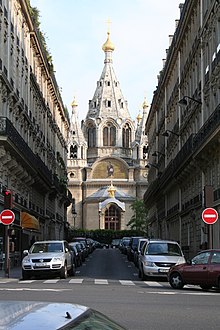Russian Orthodox Exarchate in Western Europe
| Archdiocese of Russian Orthodox churches in Western Europe | |
|---|---|

Alexander Nevsky Cathedral, Paris, home to the archdiocese
|
|
| Location | |
| Territory | Western Europe, British Isles |
| Metropolitan | Paris |
| Statistics | |
| Population - Total |
100,000 |
| Parishes | ca. 100 |
| Information | |
| Rite | Exarchate, Church Slavonic, local languages Music: Russian Chant, Byzantine Chant Calendar: Julian |
| Established | 1931 |
| Current leadership | |
| Bishop | Archbishop John of Charioupolis |
| Website | |
| exarchat.org | |
The Archdiocese of Russian Orthodox churches in Western Europe (officially the Patriarchal Exarchate for Orthodox Parishes of the Russian Tradition in Western Europe) is a patriarchal exarchate of the Ecumenical Patriarchate of Constantinople, following the Russian Orthodox tradition, based in Paris, and having parishes throughout Europe, mainly centered in France. The Exarchate is sometimes known as Rue Daru from the street in Paris where its cathedral is located.
After the onset of the Bolshevik Revolution in 1917, Russian Orthodox Christians based outside Russia and those who fled there from the communist regime found themselves in a difficult situation. A solution intended as temporary was the formation of the Russian Orthodox Church Outside Russia (ROCOR), in which during the early 1920s the vast majority of Russian Orthodox abroad participated, united by their opposition to the Soviet government. The Russian bishop of Paris at the time was Metropolitan Evlogy (Georgievsky), who had been appointed by St. Tikhon of Moscow in 1921 as the representative of the Patriarchate of Moscow in Western Europe and sat in the synod with the remainder of the ROCOR bishops.
In 1927 Evlogy broke with the ROCOR (along with Metropolitan Platon (Rozhdestvensky) of New York, leader of the Russian Metropolia in America) and was subsequently condemned by them, splitting the Russian émigré community in Western Europe. In 1928, Metropolitan Sergius (Stragorodsky), then locum tenens of the Patriarch of Moscow, demanded declarations of loyalty to the Soviet regime, a proposition which Evlogy initially supported but subsequently repudiated. In 1930, after taking part in a prayer service in London in supplication for Christians suffering under the Soviets, Evlogy was removed from office by Sergius and replaced.
...
Wikipedia
